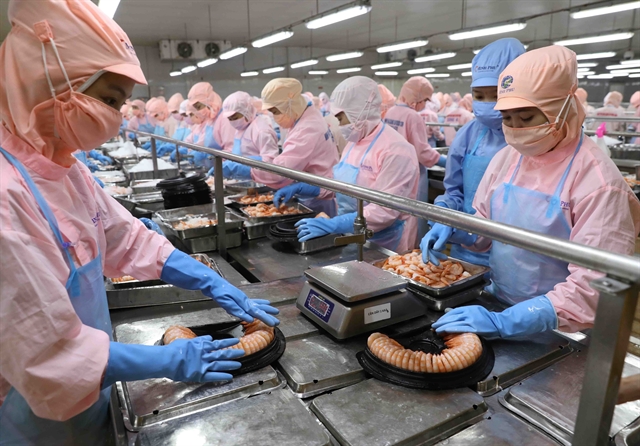 Economy
Economy


|
| The shrimp industry is expected to gain an export value of about $4.3 billion this year. — VNA/VNS Photo Vũ Sinh. |
HÀ NỘI — Việt Nam's shrimp exports face many challenges, especially in the term of price, said General Secretary of the Việt Nam Association of Seafood Exporters and Producers (VASEP) Trương Đình Hòe.
In the first quarter of this year, the shrimp export value reduced by 40 per cent on year to $577 million, according to the association.
Shrimp prices in the world market have gradually decreased since the end of 2022. For instance, at the end of February 2023, the price of Indian shrimp was at VNĐ110,000 (US$4.53) per kilo.
The prices will continue falling when the global shrimp supply increases to about 6 million tonnes.
Meanwhile, the price of raw shrimp on the domestic market has increased, making it difficult for export processing activities. The shrimp price in the Mekong Delta was nearly VNĐ170,000 per kilo, Hòe said.
Experts said that the farming cost of shrimp is high because feed price accounts for over 65 per cent of the shrimp farming cost under the industrial model.
In addition, most shrimp seeds have to be imported, so the seed price is high. The producers have also spent more on solving the pollution of water farming shrimps.
According to Hòe, in recent years, shrimp seed production management has been loosened without standards and criteria for quality assessment, while shrimp production is still rampant.
Along with that, there is not enough quality shrimp seed to raise, leading to poor-quality shrimp material.
Those are difficulties of the Vietnamese shrimp industry against its competitors such as Ecuador and India.
Dr Trần Hữu Lộc, a shrimp expert from the Nong Lam University of HCM City, said that shrimp farmers should change their thinking from agricultural production to an agricultural economy.
Now, agriculture production is to produce goods competing with the same products on the global market. Therefore, the farm produce must have competitive price, high quality and transparent origin, Lộc said.
He has proposed that Việt Nam's shrimp industry must choose a production model having production management, operation of the farming system, and treatment of shrimp waste and diseases.
In addition, shrimp farmers should optimise the use of capital, labour, farming area, water source and seed to increase output but reduce production costs and risks.
Managing shrimp seed to ensure quality is an important factor in determining efficiency in the production of the shrimp industry. It is also a solution to reduce the farming cost of Vietnamese shrimp, Lộc said.
Lê Văn Quang, chairman of Minh Phú Group, has proposed to produce high-quality shrimp seeds with disease resistance and environmental adaptation. In addition, the farmers need to manage food for shrimp seeds, have a transparent production process, and develop low-cost shrimp farming processes.
The low-cost shrimp farming process includes planning large concentrated farming areas with separate water supply and drainage channels, completed infrastructure of transport, electricity and water, and digitisation application in shrimp farming to manage traceability and reduce labour costs.
Meanwhile, the businesses need to maintain the traditional market and continue to expand the easy markets, said Trần Công Khôi, deputy head of the Aquaculture Department under the Directorate of Fisheries.
With the solutions, the shrimp industry is expected to overcome the challenges this year, gaining the target of 750,000 hectares in a farming area, an output of 1.08 million tonnes and an export value of about $4.3 billion.
Vietnamese shrimp has been exported to 100 countries, including major markets in Europe, the US, Japan, China and South Korea.
In the past two decades, the shrimp industry contributed an annual average of about 40-45 per cent of the total seafood export value.
Việt Nam has accounted for 13-14 per cent of the total shrimp export value in the world market. — VNS




